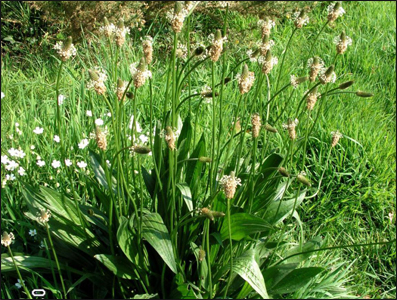What are the Uses and Health Benefits of Ribwort Plantain (Plantago lanceolata)?

There has been an exponential growth in the use of herbs in the last few years. Many traditional medicines in use are derived from medicinal plants, minerals etc. A number of medicinal plants traditionally used for thousands of years are present in herbal preparations of Indian traditional healthcare system.
One such plant is Plantago lanceolata, which has immense medicinal properties.
Historically, this plant belongs to Eurasia continent but gradually expanded around the world with the colonizers of Europe. This plant has been proclaimed for medicinal usage dating back to ancient Greeks and Romans, who used it mainly for skin infections, herpes and also as an anti-dote for rabies.
- Kingdom: Plantae
- Phylum: Spermatophyta
- Family: Plantaginaceae
- Genus: Plantago
- Species: Plantago lanceolata
- Common Name: Ribwort Plantain
Botanical Description
It is a low growing plant having lanceolate leaves. P. lanceolata is a small, glabrous plant having one to several rosettes. Its root system consists of a shallow crown of coarse fibrous roots. Its leaves are gray green to green in color and glabrous to sparsely hairy. The slender flowering stalks are devoid of leaves. The flowers have purple tinged stamens and these are densely crowded together, facing in all the directions along the spike. Each seed is oblongoid, which means it splits evenly in the lower half to release two small seeds. The seeds are dark brown to black in color. The plant spreads primarily by reseeding itself.
Ayurvedic Properties of Plantago lanceolata
- Taste (Rasa): Madhura (Sweet)
- Qualities (Guna): Guru (heavy), Snigdha (moist)
- Potency (Veerya): Cold (Sheet)
- Vipaka: Undergoes sweet taste after digestion
- Effect on Tridosha: Reduces vitiated Vata and Pitta doshas.
- Parts used: Leaves and Seeds
Key Constituents of Plantago lanceolata
It contains mucilage, tannins, glycosides, minerals such as zinc, silica, potassium etc.
Health Benefits of Plantago lanceolata
- The seeds of this plant have laxative properties due to the presence of polysaccharides in it. Polysachharides are hydrophilic in nature. The seeds absorb water and increase the stool bulk, stimulate peristaltis and facilitate the bowel movements. The mucilage can also be used as a supportive therapy in diarrhea. The seeds are also helpful in the treatment of parasitic worms.
- The leaves of Plantago lanceolata have a bitter flavor and are astringent, demulcent, mildly expectorant and ophthalmic. When taken internally, they act as a detoxifier. Leaves are useful in diarrhea, gastritis, peptic ulcers, cystitis, bronchitis, sinusitis, asthma and hay fever.
- The external application of the leaves is also useful in various skin disorders. When used externally, the leaves are useful in treating skin inflammation, cuts, stings etc. The heated leaves are used for dressing the swellings and wounds.
- The distilled water made from the plant acts as excellent eye lotion.
- The cold infusion of the seeds in the dose of 30-40 ml helps in the retention of urine.
- The seeds are also used for cooking purposes and used like sago. The seeds are grounded into a powder and added into flours in some countries.
- It is also used internally for the catarrh of the respiratory tract and inflammatory lesions of the oral and pharyngeal mucosa. Traditionally, this plant was used to strengthen the respiratory tract. This plant provides long term relief in respiratory health. This is due to their mucilage content.
- It is a safe and effective treatment for bleeding as well as it quickly halts the blood flow and also encourages the repair of the damaged tissue. The bleeding stops very quickly due to the astringent effect of tannins and demulcent mucilage components.
- Due to the presence of tannin, mucilage and silicic acid in the leaves, the extract of the leaves acts as anti-bacterial. The leaves have bitter taste and expectorant in nature.
- The roots of this plant are used as a remedy for rattlesnakes, insect stings and bites. Apply the juice of the leaves on the affected area. It is especially useful in treating children suffering from these afflictions.
- The mucilage content of this plant provides a relaxing expectorant action and the presence of tannin provides a soothing effect on the skin as well as gut lining.
Adverse Effects
Dehydration may be caused due to the excess use of the seeds of Plantago lanceolata.



